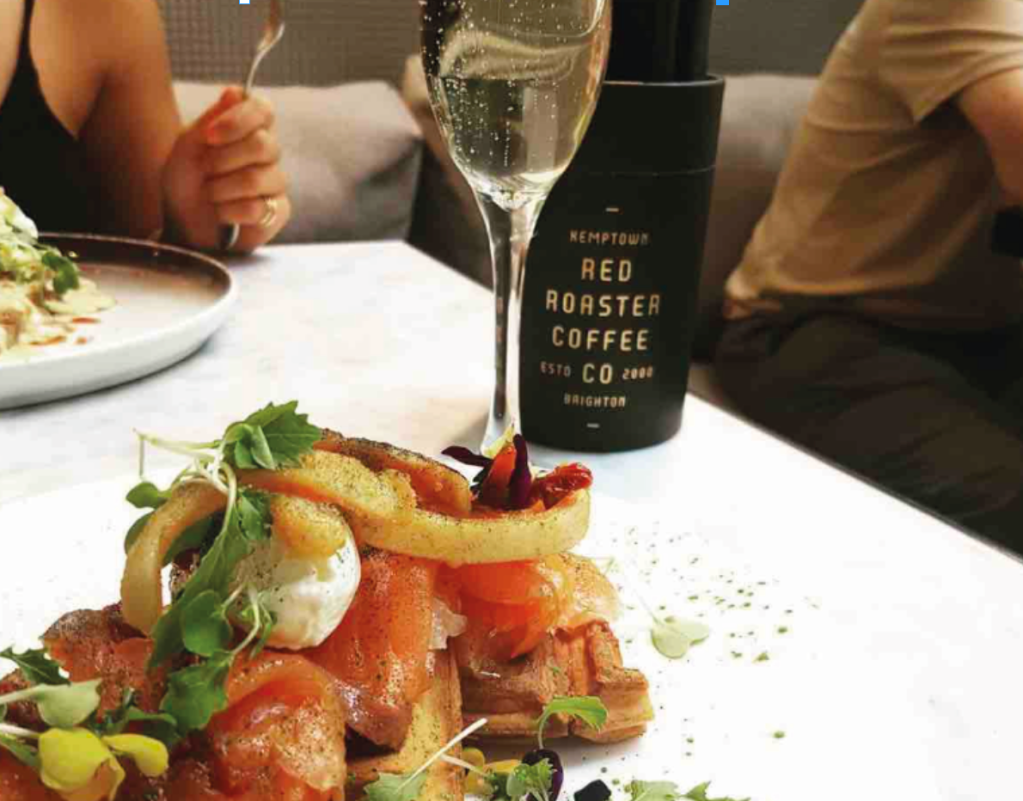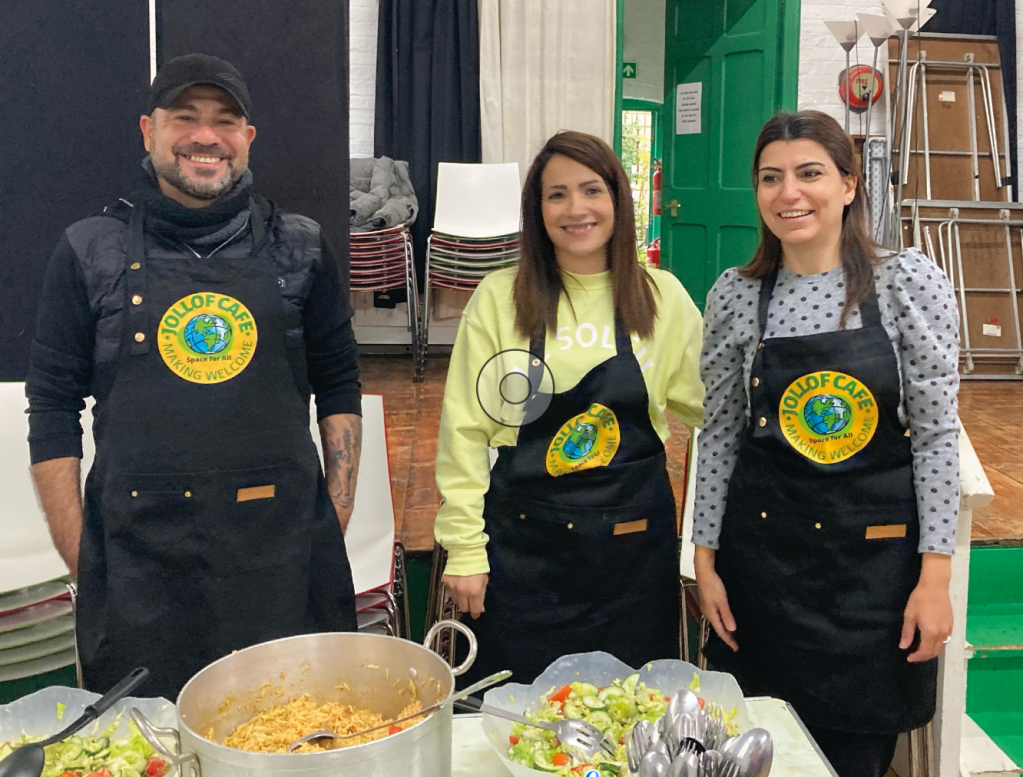
Changing the Game: How Brighton’s companies are leading the way to a greener future. Gilly Smith reports

I’m waiting for Ella Byass from Marketing at the new Red Roaster restaurant in New Road on a warm afternoon in November. The nice young waiter asks me where I’d like to sit, and I choose the quieter terrace outside as I’m about to record Ella’s interview. He fiddles with a remote and pops off to get my coffee. He’s turned the heating on. Outside.
It’s not a great start to an interview about Red Roaster’s hard-won battle for B Corp, the global accreditation that aims to shift the behaviour, structure and very culture of capitalism by exacting excellence in every inch of a business. As Ella tells me that they’re one of just 7000 companies in the world to be given its stamp of approval after its rigorous three-year assessment process, I’m still trying to square the heater issue.
Red Roaster has been one of Brighton’s most sustainable companies for years; its coffee roastery in Kemp Town is the only organic coffee roastery in the South East, and its beachfront café, Lucky Beach which won the Food Made Good People’s Favourite Restaurant award in partnership with delicious. Magazine in 2017, has been collecting gongs ever since.
Membership of the Sustainable Restaurant Association keeps the company focussed on sourcing responsibly, which includes supporting farmers who employ good animal husbandry and contribute positively to carbon capture with regenerative farming techniques to keep the soil healthy. The SRA keeps its members up to date on how best to trade, use energy and keep its carbon footprint low, but also how to interact with the community and treat its teams.
In Brighton, they’ve switched all of their delivery vehicles to electric or bikes, and are the largest employer of learning-disabled adults in Brighton. Ella tells me that 75% of their produce for their Brighton cafes are sourced locally; its cider comes from Whistler favourite, Trenchmore Farm which operates its own micro circular economy. Its organic eggs are from Rookery Farm in West Sussex and most of its seasonal produce are from Shrub Provisions, one of the increasing numbers of sustainable food hubs working with regenerative or organic local farms for next day delivery to restaurants. And where it can’t buy local, it supports the farmers’ own communities; Red Roaster’s coffee beans come from Brazil, Honduras and most notably from Rwanda where they run most of their social projects, including building schools and medical centres.
Led by early sustainability adopters, Diana and Mike Palmer, Red Roaster’s B Corp badge is only the beginning. “With B Corp, you have to constantly show how you’re improving” Ella tells me. “They’ll come back in three years’ time and say, ‘Right, this is was great three years ago, but what have you done since?’ We can’t just be like, great, we’ve got the B Corp. They’ll want to know how we’ve reduced our carbon footprint even further. They don’t allow you to use it as a green washing technique.”
As businesses try to attract and retain late millennials and Gen Z into a post Lockdown workplace where all the rules have been thrown out of the pram, sustainability is one of the most popular keywords in the search for employment. According to the Institute for Advertising Ethics, 64% of millennials will no longer work for a company that fails to show a strong corporate social responsibility. The data also shows that Gen Z are so concerned about what their peers think of their employers, that their choices are increasingly those that can prove they’re doing the right thing.
It’s an amazing story, but how will anyone know while the only connection the customer has is with a waiter who turns an outdoor heater on without even asking? Ok, so it turns out that the heaters are solar powered, but the point is how would we know? A brunch with a mate a couple of days after our interview revealed the waitresses weren’t acquainted with the company line either, and the bacon was from Ireland.
“Our sustainability story is on the menu”, Ella tells me. Now, come on; who salivates over the food options, ponders over the cocktails and then scrolls through to the last page to read the diversity pledge? We’re Whistling big time for Red Roaster, but maybe by the time the B Corp team come back to check, their waiters will be wearing the t-shirt.
Of the tiny clutch of B Corp companies in the world, we’ve got quite a handful in Brighton. And if you’re thinking about booking your next holiday, you might like to know that one of them is a sustainable travel company which says that it’s not really very cool to fly at all. “There is no denying the fact that if you fly long haul, it will make up a very, very significant proportion of your year’s carbon footprint,” says Nick Pulley, founder of Selective Asia. You’re not even going to get a virtue signalling offset plan as part of the cost of your flight at Selective Asia. “With an increasing number of reports casting doubt on the benefits of carbon mitigation, we don’t have the necessary clarity and confidence on this approach that we would ideally like,” proclaims the website.
Instead, the travel agency works with Brighton-based carbon calculating company, C-Level which works directly with environmental scientists and communities on the front line of climate change to develop conservation projects that can provide locals with an income. This is not so much about mitigating the impact of travel, but actively supporting local economies to thrive. Call it distribution of wealth.
“Travelling with a tour operator like us means introducing clients properly to the cultures and steering them away from the heavy footfall area”, says Nick. Encouraging them to eat on the streets and in family-run restaurants rather than in the larger hotels means shaking the hands that feeds, while keeping the tourist spend local. Travelling in-country by train not only avoids the carbon heavy short hop flights, but gives the traveller a chance to see the landscape and feel the distance.
Eco-tourism is about understanding impact, and we’ve got to stop flying if we’re to save the planet. But if you’ve just got to make that trip of a lifetime, make sure it helps to secure the D’ering-Dibru Saikhowa Elephant Corridor in the northeast Indian states of Assam and Arunachal Pradesh or support Lone Buffalo, the Laos community project giving free English tuition, sport and creative skills tutoring to local kids.










